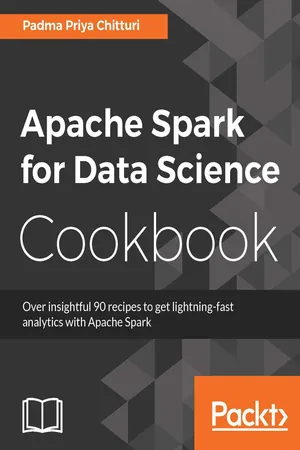
- 392 pages
- English
- ePUB (mobile friendly)
- Available on iOS & Android
Apache Spark for Data Science Cookbook
About this book
Over insightful 90 recipes to get lightning-fast analytics with Apache Spark
About This Book
- Use Apache Spark for data processing with these hands-on recipes
- Implement end-to-end, large-scale data analysis better than ever before
- Work with powerful libraries such as MLLib, SciPy, NumPy, and Pandas to gain insights from your data
Who This Book Is For
This book is for novice and intermediate level data science professionals and data analysts who want to solve data science problems with a distributed computing framework. Basic experience with data science implementation tasks is expected. Data science professionals looking to skill up and gain an edge in the field will find this book helpful.
What You Will Learn
- Explore the topics of data mining, text mining, Natural Language Processing, information retrieval, and machine learning.
- Solve real-world analytical problems with large data sets.
- Address data science challenges with analytical tools on a distributed system like Spark (apt for iterative algorithms), which offers in-memory processing and more flexibility for data analysis at scale.
- Get hands-on experience with algorithms like Classification, regression, and recommendation on real datasets using Spark MLLib package.
- Learn about numerical and scientific computing using NumPy and SciPy on Spark.
- Use Predictive Model Markup Language (PMML) in Spark for statistical data mining models.
In Detail
Spark has emerged as the most promising big data analytics engine for data science professionals. The true power and value of Apache Spark lies in its ability to execute data science tasks with speed and accuracy. Spark's selling point is that it combines ETL, batch analytics, real-time stream analysis, machine learning, graph processing, and visualizations. It lets you tackle the complexities that come with raw unstructured data sets with ease.
This guide will get you comfortable and confident performing data science tasks with Spark. You will learn about implementations including distributed deep learning, numerical computing, and scalable machine learning. You will be shown effective solutions to problematic concepts in data science using Spark's data science libraries such as MLLib, Pandas, NumPy, SciPy, and more. These simple and efficient recipes will show you how to implement algorithms and optimize your work.
Style and approach
This book contains a comprehensive range of recipes designed to help you learn the fundamentals and tackle the difficulties of data science. This book outlines practical steps to produce powerful insights into Big Data through a recipe-based approach.
Tools to learn more effectively

Saving Books

Keyword Search

Annotating Text

Listen to it instead
Information
Apache Spark for Data Science Cookbook
Apache Spark for Data Science Cookbook
Credits
| Author Padma Priya Chitturi | Copy Editor Safis Editing |
| Reviewer Roberto Corizzo | Project Coordinator Shweta H Birwatkar |
| Commissioning Editor Akram Hussain | Proofreader Safis Editing |
| Acquisition Editors Vinay Argekar Manish Nainani | Indexer Mariammal Chettiyar |
| Content Development Editor Sumeet Sawant | Graphics Disha Haria |
| Technical Editor Deepti Tuscano | Production Coordinator Arvindkumar Gupta |
About the Author
About the Reviewer
www.PacktPub.com

Why subscribe?
- Fully searchable across every book published by Packt
- Copy and paste, print, and bookmark content
- On demand and accessible via a web browser
Customer Feedback
Preface
What this book covers
Table of contents
- Apache Spark for Data Science Cookbook
Frequently asked questions
- Essential is ideal for learners and professionals who enjoy exploring a wide range of subjects. Access the Essential Library with 800,000+ trusted titles and best-sellers across business, personal growth, and the humanities. Includes unlimited reading time and Standard Read Aloud voice.
- Complete: Perfect for advanced learners and researchers needing full, unrestricted access. Unlock 1.4M+ books across hundreds of subjects, including academic and specialized titles. The Complete Plan also includes advanced features like Premium Read Aloud and Research Assistant.
Please note we cannot support devices running on iOS 13 and Android 7 or earlier. Learn more about using the app